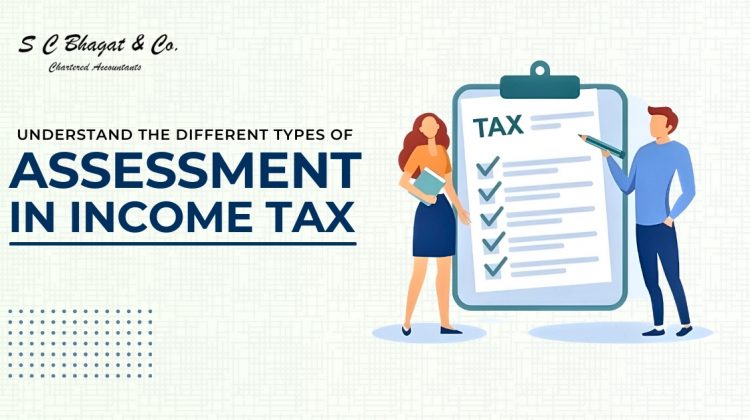Taxation is an integral part of any economy, and in India, income tax plays a significant role in revenue generation for the government. Understanding the various types of assessments in income tax is crucial for taxpayers to fulfill their obligations and avoid legal complications. This article aims to delve into the different types of assessment in income tax in India, providing clarity and guidance for taxpayers.
Introduction to Income Tax Assessment
The method by which the tax authorities ascertain a taxpayer’s tax liability is called income tax assessment. To determine the amount of tax due, consideration is given to income, deductions, exemptions, and other pertinent considerations. Evaluations guarantee adherence to tax regulations and support the preservation of the tax system’s integrity.
Types of Income Tax Assessment
- Self-assessment
Self-assessment is the method wherein taxpayers assess their own income, calculate tax liability, and pay the taxes due to the government. It requires taxpayers to file their tax returns accurately and honestly, taking into account all sources of income and applicable deductions.
a. Definition and purpose
Self-assessment empowers taxpayers to proactively fulfill their tax obligations without direct intervention from tax authorities. It promotes transparency and accountability in the taxation process, allowing taxpayers to take control of their finances.
b. Procedure and deadlines
Taxpayers must file their income tax returns using the prescribed forms within the stipulated due dates, which are typically announced by the Income Tax Department. Failure to comply with the deadlines may result in penalties and legal repercussions. - Regular Assessment
Regular assessment refers to the assessment conducted by tax authorities to verify the accuracy of the taxpayer’s income declaration. It may involve scrutiny of financial records, documents, and other evidence to ensure compliance with tax laws.
a. Trigger points for regular assessment
Regular assessment may be initiated based on various triggers, such as discrepancies in income declaration, high-value transactions, or information received from third-party sources. Taxpayers selected for regular assessment are usually notified by the tax department.
b. Procedure and timelines
During regular assessments, taxpayers may be required to provide additional information or clarification regarding their income and deductions. The assessment process is conducted by tax officials, and taxpayers are given a reasonable opportunity to present their case. - Summary Assessment
Summary assessment is an expedited assessment process conducted by tax authorities in specific circumstances. It is typically carried out when the taxpayer fails to respond to notices or when there is clear evidence of tax evasion.
a. Circumstances for summary assessment
Summary assessment may be invoked when the tax department has sufficient evidence to conclude that the taxpayer’s income has been underreported or misrepresented. It is usually initiated to expedite the recovery of tax dues.
b. Procedure and implications
Summary assessment is conducted swiftly, and taxpayers may have limited recourse to challenge the assessment. It may result in the imposition of penalties, interest, and other punitive measures for non-compliance.
Key Differences Between Types of Assessment
Every kind of evaluation has unique qualities and consequences for taxpayers. While regular assessments and summary assessments are carried out by tax authorities to confirm compliance and enforce tax regulations, self-assessment gives taxpayers the ability to proactively report their income.
Importance of Accurate Assessment
Ensuring fairness and equity in the taxation system requires accurate income tax assessment. It encourages compliance, aids in the prevention of tax evasion, and makes it possible for the government to raise funds for development and public welfare programs.
Challenges Faced During Assessment
During the assessment process, taxpayers may run into a number of obstacles, such as complicated tax regulations, paperwork requirements, and communication problems with tax officials. To properly handle these issues, taxpayers must follow the established processes and seek professional help.
Tips for Successful Income Tax Assessment
- Maintain accurate financial records
- Stay updated on tax laws and regulations
- Seek professional assistance if needed
- Respond promptly to notices from tax authorities
- Review and verify tax returns before filing
Conclusion
In conclusion, in order for taxpayers to comply with their responsibilities and stay out of trouble, they must comprehend the various forms of income tax assessments. Through self-assessment, frequent assessment, and summary assessment familiarisation, taxpayers can traverse the tax process with assurance and conformity.
FAQs
- What is the deadline for filing income tax returns under self-assessment?
- The deadline for filing income tax returns under self-assessment is typically July 31st of the assessment year.
- Can taxpayers request an extension for filing income tax returns during regular assessment?
- Yes, taxpayers can request an extension for filing income tax returns during regular assessment by submitting a formal request to the tax department.
- What are the consequences of non-compliance with summary assessment?
- Non-compliance with summary assessment may result in penalties, interest, and other punitive measures imposed by the tax authorities.
- Is it mandatory to maintain financial records for income tax assessment?
- Yes, it is mandatory for taxpayers to maintain accurate financial records for income tax assessment to substantiate their income and deductions.
- How can taxpayers verify the authenticity of notices received from tax authorities?
- Taxpayers can verify the authenticity of notices received from tax authorities by cross-referencing the details with official communication channels and seeking clarification from designated officials if needed.

